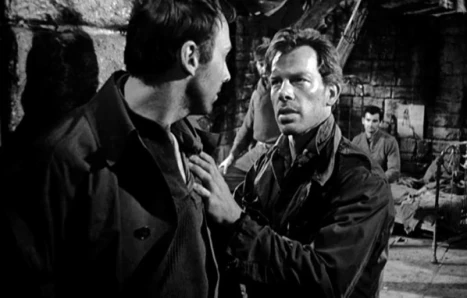News & Articles
Browse all content by date.
 Richard Kiley as the anxious Pvt. Coke and Lee Marvin as Sgt. Mooney in the 1952 World War II psychological drama Eight Iron Men.
Richard Kiley as the anxious Pvt. Coke and Lee Marvin as Sgt. Mooney in the 1952 World War II psychological drama Eight Iron Men.
Rain was falling on a pile of rubble as the movie credits came up. Then the top of the rubble seemed to be moving ever so slightly. Or is it? Suddenly the barrel of a machine gun pokes out from beneath the rubble and begins firing at three American soldiers on patrol in a bombed-out Italian city.
Pinned down by the machine gun, one of the men tells the other two to get ready to run after he throws a grenade at the machine gunner. The grenade falls short of the gun emplacement, but throws up enough smoke and debris to give the trio cover to run and get out of the line of fire. Two make it, but the third slips in the mud and takes cover in a shell hole half-filled with water.
Thus begins Eight Iron Men, a World War II tale that began life in 1945 as a three-act play called The Sound of Hunting, written by Harry Brown, who that same year saw his 1944 World War II novel A Walk in the Sun made into a movie.
On Broadway, Brown’s play featured a young actor billed as Burton Lancaster as platoon leader Sgt. Mooney and character actor Frank Lovejoy as “trigger happy” Pvt. Coke.
When producer Stanley Kramer decided to make Eight Iron Men, both Lancaster – who was a Hollywood star by now – and always reliable co-star Lovejoy were involved in other projects (Lancaster was starring in The Crimson Pirate with his former acrobatic partner Nick Cravat and Lovejoy was co-starring in the terrific Ida Lupino-directred noir The Hitch-Hiker), so Kramer had to settle for two relative newcomers in those key roles – Lee Marvin as Sgt. Mooney and Richard Kiley as Private Coke.
Kramer chose Edward Dmytryk to direct the film. Dmytryk, one of the Hollywood 10 accused of injecting films with Communist sympathies, had just been released after a four-month prison stay for a contempt of Congress charge.
After making The Sniper, starring Arthur Franz (who also appears in Eight Iron Men), for Kramer in 1952, Dmytryk was given the job of directing Eight Iron Men, developed by Harry Brown from his play.
Brown was a poet and novelist who enlisted in the Army in July 1941. In 1942 he joined the staff of the brand new military magazine, Yank, the Army Weekly, where he wrote a column under the name PFC Artie Greengroin.
In 1944 Brown wrote the novel A Walk in the Sun, about a group of GIs in the Italian invasion, which director Lewis Milestone turned into a film the following year. Milestone invited Brown to write screenplays in Hollywood. After doing two films for John Wayne (Wake of the Red Witch, 1948, and Sands of Iwo Jima, 1949), Brown wrote Kiss Tomorrow Goodbye for James Cagney, and then in 1951 won himself an Oscar for his screenplay for A Place in the Sun, the film version of Theodore Dreiser’s An American Tragedy. He followed that by writing the Eight Iron Men screenplay.
At times it comes across as a World War II Waiting for Godot with existential anguish oozing everywhere, or as Pvt. Coke says, “Nothing ever happens,” like Estragon in Godot saying “Nothing happens. Nobody comes, nobody goes. It’s awful.” (The only problem is that Waiting for Godot wasn’t produced until 1953, the year after Eight Iron Men – must have been something existential in the air).
But once you start getting to know the characters, you can’t help recognizing them as real characters in unreal circumstances.
Dmytryk originally thought he’d be directing Lancaster and Lovejoy reprising their stage roles, and was reportedly not happy to be directing a bunch of relative unknowns, but he soon learned that Marvin, who saw action in the Pacific as a Marine, was indispensable in adding authenticity to the film.
In his 1996 book Odd Man Out: A Memoir of the Hollywood Ten, written three years before his death at age 90, Dmytryk wrote this about Marvin:
“Lee was fresh from the Marine Corps - almost. He [had] a highly developed observational ability. He re-dressed our entire squad until it really looked like a group of working GIs. He could imitate the sound of every type and caliber of shell, and he showed me the way men really died on the battlefield and how their bodies looked in death.”
Marvin also came to the rescue when the rented German machine gun continued to jam during filming.
Dmytryk wrote that Marvin said, “‘Let me take a look at it.’ He spread out a sheet, took the gun completely apart in a few minutes, then reassembled it. It never jammed again. Some men have a way with dogs, some with kids. Lee had a way with war.”
After seeing Marvin in the role of Sgt. Mooney, it’s hard to imagine Lancaster playing it.
A surprise to me was Bonar Colleano in the loudmouthed role of Pvt. Collucci, the unlikely hero of the saga.
Colleano is great in the role of the platoon’s goof-off and goldbricker. When we first meet him, he is sleeping and dreaming about Rita Hayworth lookalike Mary Castle, who figures in several dream sequences.
But this guy is so good, I wondered why I’d never heard of him. Turns out he was born in America to a circus family that moved to London when he was 12 to perform at the London Palladium. Thus Colleano spent most of his acting career on the stage and in film in Britain, where it was front page news when he was killed in a car crash in 1958 at the age of 34.
As a side note, Colleano fathered a son who would go on to play drums in the Average White Band, Robbie McIntosh.
This is a very different war movie. We never really see any Germans, just their guns. None of the GIs is eager to be a hero. They call themselves the “lucky platoon” because they have remained intact, up until now with Small pinned down in the shell hole.
“We came up here with 8 men and we’re going back with 8 men. That’s how we do it in this part of the army,” Sgt. Mooney (Marvin) tells the men, even though he had earlier commented on the trapped Small, “He’s the kind of dope if it were raining soup he’d grab a fork.”
Almost everyone agrees that they need to rescue Small from the shell hole, except their Captain, who orders Mooney not to risk any lives in retrieving Small.
Eventually Mooney ignores the Captain, but the group assigned to bring Small back, including Mooney himself, fails.
That’s when Collucci comes to the rescue, suffering a headshot in the process that might have been fatal if not for his girl craziness, which caused him to stop and stoop to see a pin-up spread in a magazine on the ground just as the German sniper fires with a glancing blow off his steel helmet.
No one knows what Colucci is up to until her returns to the group, after rolling Small into the room where the platoon has spent the last 17 days. He looks dead, but Collucci explains that Small twisted his ankle when he slipped, so gave himself a shot and fell asleep. When his colleagues complain about him being asleep, Small says, “What’s the matter with you guys? If you’re going to act like this, why‘d you bring me back for? I was comfortable out there.”
Like A Walk in the Sun, Brown has imbued these GIs with humanity, the good and the bad of it.
| Tweet |


